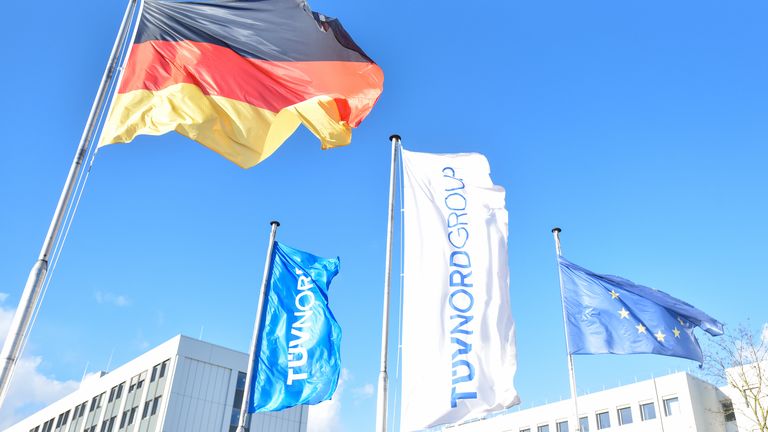Here are the answers to questions which are often put to TÜV NORD GROUP (TNG)
Again and again, people ask questions about the work of the TÜV companies, test marks and certifications. Is the TÜV run or owned by the state? Are the different TÜV companies only allowed to work in certain regions? Who really checks up on the TÜV inspectors and the tests they carry out?
No, TNG is a privately-run, legally independent company. It does not have the status of a statutory authority, nor is it linked to the state. The only exception is that in several German federal states, TNG organises and carries out driving tests on behalf of the state. In all other areas of its work, TNG is in competition with other inspection organisations, such as for example TÜV Rheinland or TÜV Süd.
Before the complete liberalisation of the TÜV areas of activity, the TÜV companies were only allowed to work in the regions that had been specifically laid down for them, e.g. TÜV NORD could only work in the north of Germany. This is the origin of the different TÜV names, which are well known to TÜV customers and the general population. Now, the different TÜVs can offer their services in all the different regions – and also throughout the world (Exception: driving tests, see Answer 1)
TÜV NORD GROUP is owned by the following not-for-profit associations: TÜV NORD e.V. (36.1 %), RWTÜV e.V. (36.1 %) and TÜV Hannover/Sachsen-Anhalt e.V. (27.8 %). These associations have several thousand members. However, the members are not shareholders in the sense of company or association law and they do not have any claim to the assets of the association or the Group. This independence is very important for the neutrality and impartiality of TÜV NORD GROUP.
TNG does not aim to make fast profits. Except for a very small residual amount, profits are left in the organisation and serve to strengthen it from the economic and business points of view. The associations that own TNG receive a small dividend in order that they can cover their business and tax obligations. Among other things, the owners use the profits to fund innovative technology projects. A further example of use of TNG profits: in 2012 the first junior professor for IT Law at the University of Münster was provided with funding.
Energy companies are – like many other operators of plant and equipment – members of the TÜV associations. Their voting rights are limited, so that they are not able to “dominate” a members’ meeting (e.g. in the appointment of Supervisory Board Members). They do not have any influence whatsoever on the operative business of the TÜV companies, which means that the independence and neutrality of inspections are strictly maintained.
TNG has operated a very comprehensive and efficient quality management system for about twenty years now. All those who work within the organisation – from the Board of Management to the independent experts on the ground – have to fulfil the requirements of this system. This is essential for the business success and the growth of the organisation. In addition, comprehensive audits performed by external certification companies provide external verification that the QM system is observed and fully operational.
The “Tested by TÜV” certificate is worth a great deal to the general public and also to companies and organisations. In today’s globalised world, where work is broken down more and more into specific tasks performed by different companies in many different countries, demand for neutral, independent and competent testing, assessment and certification services is growing. In step with this, the range of services we offer is continually expanding.
As work is being broken down into many specific tasks performed by different companies in different countries, TÜV also has to offer its services abroad. This is the only way in which it can be certain that all those in the value added chain are subject to inspection, and therefore that the necessary quality requirements are fulfilled. Even products that are mostly manufactured in Germany contain more and more individual components that are sourced throughout the entire world.
Together with the Board of Management, staff representatives and employees, corporate guidelines have been developed which regulate work and mutual relationships within the Group. All employees prescribe to the basic principles of independence and integrity. In addition, the principles of Corporate Governance set the framework for management and supervision of TÜV NORD GROUP. Acceptance of the compliance rules by the employees ensures that all the relevant laws, ordinances, directives and contractual obligations are observed. In addition, TÜV NORD GROUP has an ombudsman to act as an external contact in the fight against corruption.
A certification is an independent assessment. This assessment evaluates and attests fulfilment of legal rules and regulations and voluntary standards regarding products, people and management systems. Certifications mean, for example, that processes can be designed more efficiently and products can be made safer.
A neutral certificate provides a respected proof of quality for employees, cooperation partners and consumers. Companies, public authorities and other organisations profit from this, both in representing themselves to the outside world and through the optimisation of internal processes and procedures. Amongst other things, certification can improve the quality of a product, reveal savings potentials and protect the environment.
A neutral certificate provides a respected proof of quality for employees, cooperation partners and consumers. Companies, public authorities and other organisations profit from this, both in representing themselves to the outside world and through the optimisation of internal processes and procedures. Amongst other things, certification can improve the quality of a product, reveal savings potentials and protect the environment.
The public focus is often on test marks for consumers, e.g. those regarding the quality of food. A large certification company like TÜV NORD CERT considers this subject in a more integrated way. When making major purchasing and investment decisions, companies need information regarding the quality and performance capacity of possible suppliers. “Getting it right” is often a major factor in success or failure – for financial reasons and also for reasons of liability. Certification, which is often attested by means of a test mark, helps when selecting suitable options. Certifications and test marks provide information about the quality and performance capacity of companies and other organisations.
Generally, certifications are based on national, European or international standards, such as ISO 9001. In this case, the certifier, as a so-called conformity assessment body, is monitored by government agencies or statutory authorities. These include the German accreditation body DAkkS (Deutsche Akkreditierungstelle), the ZLG (Central Authority of the Länder for Health Protection with regard to Medicinal Products and Medical Devices), the central agency for security technology for the federal states ZLS (Zentralstelle der Länder für Sicherheitstechnik) the VDA (German Association of the Automotive Industry) and the ASI (Accreditation Services International). In addition, there are independent standards which are not subject to state control.
The auditors are supervised both internally and by the state supervisory authorities. The supervision includes the requirement that the auditor must always be able to prove that he or she holds the necessary qualification to perform the audit and has sufficient practical experience (in the form of audit days on site with clients). Supervision also takes place in the form of so-called witness audits, where the auditors are inspected when performing their tasks by experts from the state authorities, in the same way as driving test examiners.
Upon request, every certification company working in Germany has the legal obligation to provide information regarding the period of validity and the scope of certificates it has issued. Requests for this information are generally made in the form of written or telephone enquiries from consumers.
The requirements regarding reproducibility of test results are very strict. All criteria catalogues must be structured in such a way that room for interpretation is reduced to a minimum; auditors with the same or equivalent qualifications must reach almost the same conclusions. Generally speaking, the certification criteria are contained in internationally-recognised norms and standards. In many cases, conclusions regarding “pass” or “fail” are based on the results of specific measurements.
Read more
News
You can also find all the latest information about TÜV NORD GROUP in our Newsroom.
Career at TÜV NORD GROUP
Become part of the team!
You will find all information in our career portal.


